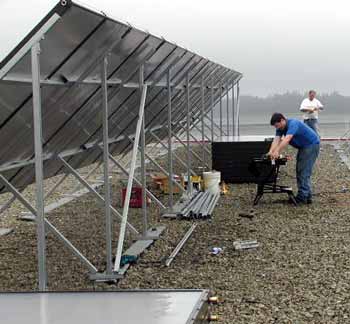Support for solar in the U.S. has almost single-handedly been supported by
state policies. But now, even the lukewarm U.S. Federal support will
greatly eclipse its northern neighbor. Under the new Conservative party
control of the Stephen Harper administration, the Canadian Federal
government has slashed funding for the only federal solar program in the
country.
Currently there are no programs at the Canadian federal level that support
solar photovoltaic (PV) power, but the one remaining program that supports
solar thermal is likely to get the ax under the federal budget released
last week. The Renewable Energy Deployment Initiative (REDI) provides a
modest CAD $5 million to subsidize 25 percent of the installation costs
for commercial-scale solar thermal project.
"There's a slash and burn going on right now in Canada to eliminate
anything that doesn't fit into the Conservative agenda," McMonagle said.
"Just as we're starting to get going as an industry, firing on one
cylinder, there was this change in the Federal Government."
McMonagle said the budget released last week slashed funding for any type
of global warming or Kyoto protocol related program. Some class of "clean
air" initiative is expected later this summer from the Harper government,
but McMonagle is highly doubtful it will include any effort to support
clean energy, particularly solar.
The ironic backdrop to this Federal program cut is that Canadian
provincial support has moved the other direction altogether with provinces
such as Nova Scotia, British Columbia and, most recently, Ontario,
establishing support mechanisms and programs to support renewable energy.
Less than a month ago, Ontario was widely hailed for passing its long-term
Standard Offer Contract, which is modeled after the same landmark
"feed-in" rebate policies that have made European countries like Germany
and Spain beacons for renewable energy use around the world.
On some levels, this disconnect between Canadian provinces and the Federal
government that echoes the situation in the U.S. where state policies have
been the greatest supporters of renewable energy while the U.S. Federal
government -- despite a crescendo of rhetoric -- has been rather
restrained.
But nowhere is a Federal void of support for renewable energy -- even
downright hostility towards it -- more apparent than in Canada, says Peter
Allen, President of Thermodynamics, manufacturers of flat-plate solar
thermal collectors, and an example of a domestic Canadian manufacturer
that will be affected by the expected dissolving of the last solar thermal
program.
"I didn't expect anything interesting from Mr. Harper and his Conservative
party," Allen said. "They have a hostile attitude toward the environment
and renewable energy. The handwriting is on the wall, they're just more
interested in burning oil."
Allen's company, based in Dartmouth, Nova Scotia, is a relatively small
operation with around CAD $1 million in yearly revenue split equally
between domestic and international sales. He says he knows of a dozen
commercial solar thermal projects that are on hold or will shortly be
cancelled altogether because the Federal funds for the REDI program have
been frozen.
Allen says that "folks like to slam the U.S." for its inaction on global
warming and the Kyoto protocol but he says there's a major disconnect
between what Canadians think Canada is doing for clean energy and the
environment, and what it are actually doing. Canada previously joined
other nations in agreeing to the terms of the international global warming
treaty, the Kyoto protocol, but Allen says little has been done besides
the symbolic Canadian signature.
He added that the U.S. has done much better in terms of supporting
renewable energy by being up front about not supporting the Kyoto
agreement but making sure there is some funding for renewable energy
programs. In fact, Allen said, funding has increased overall under the
Bush Administration, while his own country, even under its previous
Liberal administration, has done little for renewables at the federal
level.
The Canadian Parliament is widely expected to pass the budget that will
shut down the REDI solar thermal program indefinitely, leaving all policy
support for solar energy up to the provinces.

